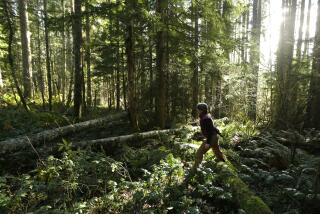Debt-for-Nature Swaps Help Foster Conservation in Some Developing Countries
- Share via
GENEVA — Bolivia’s rain forest is helping to pay the country’s foreign debt under a novel scheme devised by conservation groups.
So-called debt-for-nature swaps between conservation groups such as the World Wide Fund for Nature and developing nations of Asia and Latin America began two years ago and have recently expanded to Africa.
The conservation group buys a portion of the developing country’s debt from the creditor bank at a discount. The country then repays the conservation group by setting aside the face value of the retired debt in its own currency for environmental projects.
Conservation International, a private Washington-based nonprofit organization, pioneered the scheme with Bolivia through Citibank.
The La Paz government pledged to set aside permanently 3.7 million acres of Amazonian rain forest in exchange for the cancellation of $650,000 of its debt.
The debt was purchased at a discount of 85% of its face value. The protected zone in northeastern Bolivia supports 13 species listed as endangered, 500 types of birds and a population of nomadic Indians.
The deal caused some controversy in the South American nation although the land was and remained under government control, but with better protection.
“The government of the time had a hard time convincing protesting left-wingers that it was not selling off parts of the country,” a Bolivian diplomat in Geneva told Reuters.
Nevertheless, debt-for-nature swaps have continued, helping conservation efforts in Ecuador, Costa Rica and the Philippines.
“The result is twofold. On the one hand, you alleviate debt pressure, even if relief is small compared with the overall burden of a given country. On the other, you reduce damage produced by developing countries on their own environment,” says Philippe Roch of the World Wide Fund for Nature in Switzerland.
He argues that there is a direct link between the Third World’s debt and environmental damage.
To repay their debt, some developing countries have to increase agricultural output in order to export, causing soil erosion and destruction of their forests in the process.
“What we are saying to these countries is: We buy back part of your debt and in exchange you undertake to invest the amount in environment protection schemes,” Roch says.
The World Wide Fund for Nature notes that the scheme was endorsed by leaders of the group of seven most industrialized countries at their Paris summit in July, which called for more such swaps.
“The scheme has only begun to gather momentum and it is bound to develop,” says Roch.
He cited agreements with Madagascar and Zambia in Spetember, the first in Africa, and said negotiations were under way with Peru, Mexico and Tanzania.
To date, eight debt-for-nature swaps have been arranged between developing nations and the WWF, which was founded 28 years ago and is the world’s largest private conservation organization.
With WWF help, Madagascar in September bought back $3 million worth of foreign debt at a nominal 55 cents on the dollar.
It will repay WWF in Malagasy francs, which the organization will use over the next three years to pay and equip 400 forest rangers to help fight some of the worst deforestation in the world.
The deal does not amount to much when compared to Madagascar’s total debt of $3 billion.
The same is true of Zambia, which signed a similar accord less than two weeks later amounting to $2.27 million. Its total external debt stands at $4.5 billion.
“The figures involved are modest but they multiply the means of action of an organization like ours, which does not have a big budget,” says Roch.
The Zambia deal, under which the WWF purchased $2.27 million of Lusaka’s debt to commercial banks for $470,000--paying only 20 cents on the dollar--was arranged through the Netherlands’ NMB bank.
More to Read
Sign up for Essential California
The most important California stories and recommendations in your inbox every morning.
You may occasionally receive promotional content from the Los Angeles Times.













